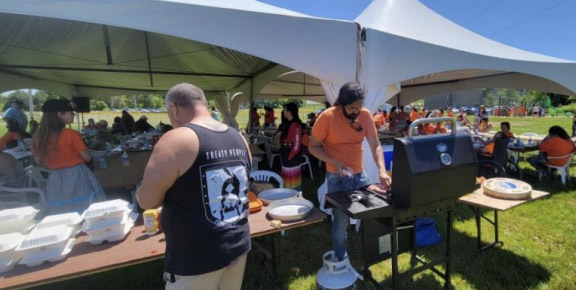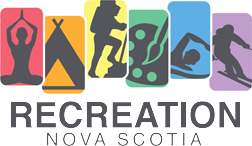 For National Indigenous Peoples Day, I had the pleasure of volunteering at the third annual Freedom Day in March in Sipekne'katik (Shubenacadie). This event was created to honour the legacy of Indian Residential School (IRS)* victims, commemorate the 215+ children discovered in unmarked graves, and advocate for further investigations across IRS sites.
For National Indigenous Peoples Day, I had the pleasure of volunteering at the third annual Freedom Day in March in Sipekne'katik (Shubenacadie). This event was created to honour the legacy of Indian Residential School (IRS)* victims, commemorate the 215+ children discovered in unmarked graves, and advocate for further investigations across IRS sites.
This event was organized and led by Tara Helen Lewis – whose father inspired her leadership – Joey Brooks, and partners of Mawikuti'k - Growing Together. This event was self-governed as a way to promote indigenization and community healing. They brought survivors from PEI, recruited volunteers, fed 100+ participants and used the networks of elders and councillors to build capacity around the event. When approached, they accepted support from the Municipality of East Hants and Lighthouse Ministries, who knew of this event and saw its importance.
On a personal level, this event showed me the power of leadership that stems from within a community because of local knowledge and self-determination. For example, the exact location and path of the Freedom Day Walk were symbolic. The route started at the Residential School's original location and finished at the train station many victims used when they arrived or departed. This route made this walk meaningful; it made one reflect on the journey and emotions victims may have felt as they became immersed in the collective experience.
Throughout the day's events, I fostered relationships by taking leadership from others and offering support where needed. The hours of meeting individuals, problem-solving together and listening to the experiences of IRS survivors were invaluable. There is only so much you can read about and much more you can learn from experiencing and feeling. The ability to be present, listen and learn was a privilege.
 But how does this experience apply to the recreation sector? Recreation Nova Scotia gets asked how best to reach equity-deserving groups for programming and collaboration. There are toolkits and research to help answer this question, but sometimes the best way to start is simply by being present, showing up as yourself, and being humble enough to know if your help is wanted or needed in the first place. Being present in a community with its members and leaders is the best way to ignite a spark for collaboration because it is about making genuine connections. There is no quick fix for creating relationships with any community. It takes time and work, just like any relationship we encounter in life.
But how does this experience apply to the recreation sector? Recreation Nova Scotia gets asked how best to reach equity-deserving groups for programming and collaboration. There are toolkits and research to help answer this question, but sometimes the best way to start is simply by being present, showing up as yourself, and being humble enough to know if your help is wanted or needed in the first place. Being present in a community with its members and leaders is the best way to ignite a spark for collaboration because it is about making genuine connections. There is no quick fix for creating relationships with any community. It takes time and work, just like any relationship we encounter in life.
Find opportunities to volunteer, celebrate or commemorate in the communities you're trying to reach. Attend, support and learn from their self-influenced events. Take time to reflect on the event's objectives, who is involved and if you see a way you could support a similar initiative in the future. But remember that not all spaces are meant for you or your organization, so communication and insight are key. If you are invited or find open opportunities, however, showing up is just one piece of the puzzle; show up as yourself and be humble.
There are times within the recreation sector when projects get created without considering their true impacts on the community because of variables like timelines and meeting grant objectives. This becomes problematic. Without regional and cultural knowledge of a community, we, as recreation professionals, sometimes dictate the wants and needs of these communities. For those of us who work within institutions, albeit non-profit, government, or business – sometimes our best attempts can do more harm than good. As individuals and professionals, we need to understand where the community is coming from and why those we invite to our spaces may not appear. For example, unless the networks are built, we cannot simply post an event catering to X online and hope X folks show up. To have the proper insight, we must show up as ourselves in these communities to learn from them, see their needs, and challenge our complacencies in how our work hinders or helps a community's objectives.
By actively engaging with those we want to serve, we can learn how to enhance our programming, foster inclusivity, and create meaningful experiences that resonate with the diverse populations of Mi'kma'ki. Showing up also helps establish trust, credibility, and rapport. These connections are crucial for successful collaboration, as they facilitate a deeper understanding of the community's needs, preferences, and aspirations. If we foster these meaningful relationships, recreation becomes a catalyst for positive change and social connections and contributes to the overall well-being of all communities. In short, show up, be present, make genuine connections and reflect on where you can support. Most importantly, be humble enough to know if your services are needed or not.
* IRS stands for Indian Residential Schools. Please refer to the history of the terminology for more insight: visit Historical Background: The Indian Act and the Indian Residential Schools *
















